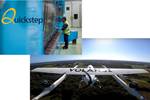NCC to play key role in U.K./Australian advanced materials collaboration
Funding announced for innovative proposals cover integration of composites, adhesives for structural joining, joining high-temperature structures and improving armor systems.

Photo Credit: Getty Images
It was announced on Feb. 19 that the (NCC, Bristol, U.K.) will be playing an important role in a bilateral international program between the U.K. and Australia to accelerate the integration of advanced materials into military platforms.
Nine partner teams across both nations have received Phase 2 funding worth a total of £1.48 million ($2.82 million USD) from the U.K. and Australian governments to develop innovative proposals covering integration of composites, adhesives for structural joining, joining high-temperature structures and improving armor systems.
U.K. consortia include:
- Foresight Innovations Ltd., Hephaestus Consulting, Nottingham Trent University and Matrix Composites
- TWI Ltd.
- University of Surrey, QinetiQ and the NCC
- Zentraxa Ltd. and QinetiQ Australia
Australian teams involve:
- Western Sydney University, Imperial College London, Metrologi Pty Ltd., UNSW and Airbus Australia Pacific
- Qinetiq Australia Pty Ltd. and RMIT
- University of New South Wales, Imperial College London, Advanced Composite Structures Australia Pty Ltd
- University of Adelaide, Research Institute of Saint-Louis (ISL – France) and Materials Science Institute
- RMIT University
This program is jointly funded by the Australian Next-Generation Technologies Fund run by DST Group; and the Ministry of Defence Materials for Strategic Advantage program in the U.K. Both nations used a common assessment framework managed by the U.K.’s Defence and Security Accelerator (DASA). Assessment and moderation of the competition was carried out collaboratively by Dstl (Defence Science and Technology Laboratory, Salisburgy, U.K.) and DST Group (Australia).
“The U.K. and Australia have an enduring defense relationship,” says the U.K.’s Minister for Defence Procurement, Jeremy Quin MP. “As we take on a range of new challenges, I am delighted we will be working together to ensure our personnel are armed with the most advanced technologies. These joint challenge projects represent both countries’ innovative visions for the future, while supporting our academic and industry partners.”
According to Australian Minister for Defence Industry, Melissa Price, the joint research proposals demonstrate the close practical cooperation between defense industry and universities across Australia and the U.K. “These joint challenge projects have not only strengthened our bilateral defense relationship but provide support to each country’s respective defense industries to overcome capability challenges we face. Academic and industry partners are vitally important to both defense forces.”
The joint effort reportedly gives both nations access to international research using a total pooled fund of around £2.52 million ($3.5 million USD) from the two phases of the competition so far. Across themes, individual proposals were also chosen to support mutual reliance with one nation taking the lead. The new projects start in 202020/21 and run for up to two years.
Related Content
-
“Structured air” TPS safeguards composite structures
Powered by an 85% air/15% pure polyimide aerogel, Blueshift’s novel material system protects structures during transient thermal events from -200°C to beyond 2400°C for rockets, battery boxes and more.
-
What you might have missed at Paris Air Show 2025
A surge in defense spending, partnerships in hydrogen propulsion and new combat aircraft agreements, many backed by composites industry leaders, culminated the 55th Paris Air Show.
-
Carbeon C/C-SiC ceramic matrix composites without fiber coating
Dutch startup Arceon is working with leaders in space, hypersonics and industry to test its Carbeon CMC, validating near-net-shape parts with <3% porosity and performance at 1600ºC, targeting UHTCMC and a presence in the U.S. in 2025.






